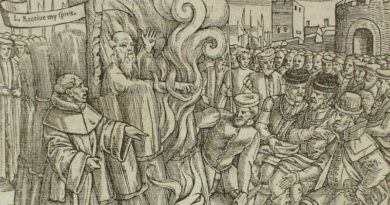The Second Coming of Christ
By Peter Armstrong
THE YEAR 2020 is one which many of us would like to forget, if we could. The COVID-19 pandemic overshadows everything else, but that’s not all: 2020 has been a tumultuous political year for our southern neighbours. Nor is Canada immune from troubling questions about our relationships with Indigenous Peoples and other issues of race, poverty, addiction, health and education. Shadows looming over us all include the slow burn of the global environment crisis and our governments’ financial capacities following the pandemic. We ask with the Psalmist, “How long, O Lord?”
“How long, O Lord?” We are not the first generation to ask this question. Battered, bewildered and amazed, the apostles ask the risen Christ when God’s kingdom will be restored (Acts 1: 6). The Lord Jesus chides them for asking what is not their (nor our) business to know. Instead, Christ assures them of the Spirit’s power upon them, in order that they can be witnesses to him throughout the whole world.
The season of Advent is a time of preparation, of course, to celebrate the Incarnation of the Son of God among us. It’s not a month-long Christmas party, after which we collapse with exhaustion on the night of December 25th. Rather, we’re invited to join in the Church’s discipline of waiting, of preparation, of anticipation – the celebration of Christmas is far sweeter when we curb our impulses, and learn to wait.
How do we curb the premature race to Christmas? It is un-Christian and churlish to refuse to appear at the office Christmas party, or not to attend the children’s school holiday concert. Rather, we need to draw on all the theological and devotional resources the local parish provides, and to keep our eyes firmly on the prize, which will be lovelier when the season truly arrives.
Advent, however, is not only a time to remember Christ’s First Coming. It is also a time to anticipate his Second Coming, not as a helpless baby, but as the One who will judge the living and the dead. This future historical fact should not make us want to run in terror, but to leave behind even more earnestly all the foolish little sins and foibles to which we still cling, and to want to run with joy into the arms of Jesus, whose arms were once outstretched on the cross to embrace this broken world. Our orientation is not to be toward sin, and away from God, but the reverse – away from sin, and toward God, in trembling, humble, aching joy.
Like the first disciples, we do not know when the great reunion will be. Perhaps the groaning of this generation is indeed the beginning of the birth-pangs. Perhaps it is simply a further reminder of the world’s brokenness, and our universal need for Christ’s salvation and his kingdom. It matters, of course; but truly, it is not our place to be self-absorbed about the exact time of Jesus’ return. We need to keep re-learning that we’re not really in charge. We are servants, ambassadors and stewards. We do not own the vineyard – the cosmos is in far more competent hands. Thank God for that!
The risen Jesus reminds his friends not to be preoccupied with what is really God’s business, but to know the power of his Spirit, and to get about doing God’s work: To witness to the risen Jesus and all that follows. That is, our Christian witness is to point to God’s work throughout all history, manifested supremely in Jesus Christ. Not only are we to proclaim; we are to serve too. “Because our gospel came to you not simply with words, but also with power” (I Thessalonians 1: 5). We need to share how God is active in the world, and to be in cooperation with it. The kingdom of God is merciful, just and righteous.
It will not necessarily be easy. The mature Christian life is not for the lazy or the self-centred. Yet nor are we to be anxious, for “perfect love casts out fear” (I John 4: 18).
We are assured of the Lord’s ongoing presence, and that it will be worthwhile beyond all our imagining. God did not become incarnate to make life easy, but to make the destiny of the faithful great.
In the Name of the Father, the Son and the Holy Spirit. Amen. TAP
The Rev’d Peter Armstrong is the Rector of St Brice, North Bay in the Diocese of Algoma.




